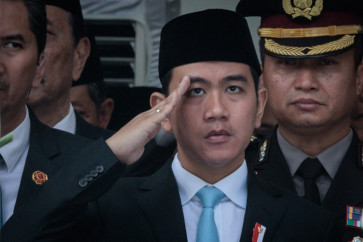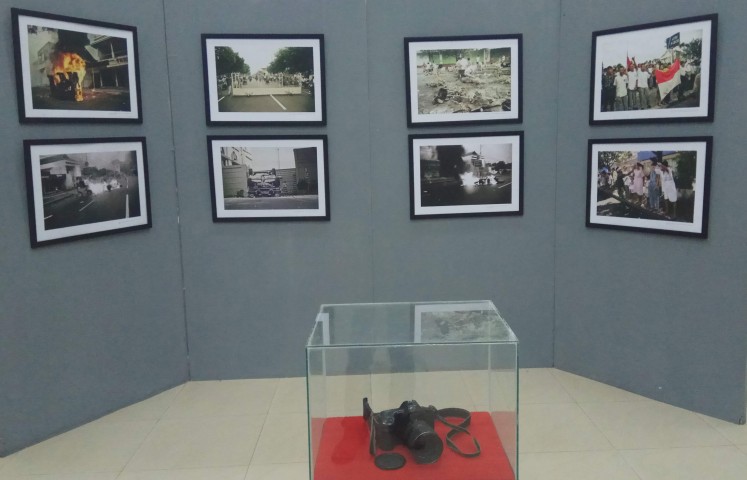Popular Reads
Top Results
Can't find what you're looking for?
View all search resultsPopular Reads
Top Results
Can't find what you're looking for?
View all search resultsA warning for disrespectful conduct against women in the military
Earlier this month, Australiaâs Chief of Army Lt
Change text size
Gift Premium Articles
to Anyone

E
arlier this month, Australia's Chief of Army Lt. Gen. David Morrison gave a stern warning concerning demeaning conduct of troops under his supervision.
The military revealed degrading emails, in circulation since 2010 and involving at least 90 personnel, including some in high ranking positions such as lieutenant-colonel, majors, warrant-officers, sergeants and corporals, mostly served in the Australia Defense Force (ADF) Army.
These troublemakers in the service named themselves the 'Jedi Council' having their pride boosted by sharing their experience of meeting women by circulating the women's photos, video and contact details for other group members to view, and subsequently approach them.
These women are military personnel, government officials and members of the general public. This was deemed disrespectful and resulted in General Morrison releasing a public video as a warning to his staff.
'Those who think that it is okay to behave in a way that demeans or exploits their colleagues have no place in this army', Let. Gen. Morrison stated in his video that has been widely viewed on YouTube.
He continued, 'If that does not suit you, then get out. You may find another employer where your attitude is acceptable, but I doubt it. The same goes for those who think toughness is built on humiliating others.'
General Morrison's statement needs to be applauded as he confirmed that female soldiers and officers, who had been engaged in Afghanistan since 1999, had been proven combat worthy and that their contribution was vital
for maintaining Australia's military capacity.
His comments were in response to the crisis but this is not the first time he had addressed the need to respect women, including women in the military.
At the United Nations headquarters, on March 8 this year, Let. Gen. Morrison delivered a speech at the International Women's Day commemoration.
His statement seemed genuine, stating that he was born as a man from a well-off family so is therefore not accustomed to routine discrimination.
Morrison admitted that he received the 'benefits of masculinity and patriarchy' therefore he might have limited perspective but he sincerely supports women in the Australian military and expects them to thrive.
In his UN speech, he also noted that the disclosure of shameful ADF cadets broadcasting inappropriate sex videos via Skype in 2011 were one of the results of military-culture defined by the exclusion of women.
The Skype incident opened Pandora's box, when investigators received over 1,000 claims of sexual, physical and mental abuse since the 1950s that compelled the government to apologize openly and change its military policy.
Now, the 'Jedi Council' is another issue the Australian military needs to bravely address, and similarly, other countries' modern militaries.
The United States military, conversely, had been timid in exposing such issues. Even the women serving in the armed forces are not all supported in addressing sexual assault, perhaps because rape is still considered a private taboo topic to discuss.
One example was US Air Force Let. Gen. Susan Helm's decision to reject legal council's conviction against a member of her staff, a captain that had been found guilty of sexual assault against his female lieutenant.
A Pentagon survey had revealed that there were an estimated 26,000 sexual assaults in the service last year.
Although rape and sexual assault are difficult to prove, if the misconduct that took place continuously reoccurred in the organization, it can be said that the action is systematic.
The organization might be encouraging the assaults by turning a blind eye.
Another example can be seen in the documentary film The Invisible War by Kirby Dick (2012). It shows how rape in the US military is still left unaddressed, leaving rape-victims without sufficient support to pursue justice as well as reconstruct their life after the assault.
The film depicted female personnel's difficulties reporting experiences of sexual assault because they are required to report it first to their chain-of-command superior, which, in some cases, might be their attacker.
One notorious line from the movie is that the US military standard to sexual assault is designed 'to help women get raped better', noted by criminal investigator Sergeant Myla Haider.
Incidents of single women raped by married men were charged as adultery and the attackers left unpunished.
Currently the US government is discussing the defence bill, making it difficult for commanders to reject court decisions and giving out harsher punishments for sexual assault crimes.
In Indonesia, the most reported cases of military sexual misconduct are against personnel deployed to border areas, such as Aceh and Merauke.
According to women's rights organization LBH Apik there were around 30 reports where soldiers were dating local women and when their deployment period ended they left without taking responsibility for the women.
Another organization, Commission for Missing Persons and Victims of Violence (Kontras), filed a report of one sexual harassment case in Jayapura in 2008. Earlier this year, a captain stated women should go through virginity tests before they can enter the Army Military Academy.
One way to solve issues of violence against women in the armed forces is for a Military Court Bill to include regulations for military personnel who perpetrate criminal acts to receive trial in a public court.
In the military court, actions such as harassment or other acts of violence will be seen merely as disciplinary misconduct but not violence against other human beings.
Another way is by creating an environment that respects women in the military by encouraging leaders to act like Let. Gen. Morrison, and have the strength to say if you cannot respect women, get out!
The writer is an associate research fellow at the S. Rajaratnam School for International Studies, Nanyang Technological University, Singapore.









